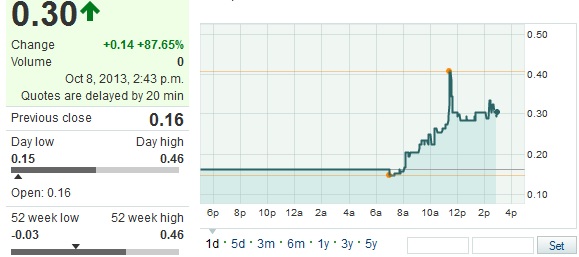One-Month T-Bill Shows Market Skittishness
As we continue to approach the October 17 deadline when the Treasury Department estimates that extraordinary measures will be exhausted, leaving Treasury with a dangerously low cash balance to finance new government obligations, the bond market is getting more and more nervous about lawmakers' ability to avoid hitting the debt ceiling. Today, yields on one-month T-bills jumped by as much as 30 basis points (0.3 percentage points) to their highest level since October 2008 (0.46 percent), although the yield fell back below 0.3 percent later in the day.
Still, the trend for one-month bills over the past month illustrates how the lack of resolution to normally-routine budget occurrences is creating unnecessary uncertainty. The yield also jumped immediately the first day of the government shutdown from near zero to 0.1 percent, even though the shutdown doesn't directly affect Treasury's ability to pay interest on government debt. Clearly, what the shutdown represented -- government dysfunction -- was enough to increase pessimism about lawmakers' ability to raise the debt ceiling. There was a similar rise in one-month yields in the run-up to the August 2 debt ceiling deadline in 2011, which quickly evaporated after it was lifted.

Source: MarketWatch
The rise should underscore that there is a cost to waiting to raise the debt ceiling, let alone blowing past October 17. There has already been research done showing that there was a direct cost to the federal budget from the 2011 showdown, pegged at $1.3 billion in that year by the Government Accountability Office and $19 billion over ten years by the Bipartisan Policy Center. Judging by the comparative size of the interest rate rises and increases in federal debt since 2011, the cost could be even higher this time around. Notably, increased interest rates on federal borrowing can also flow through to new homebuyers, car loans, and credit card interest rates.
The rise in the T-bill yield also underscores interest rate risk in the federal budget. Even though it is effectively a self-inflicted interest rate rise, it still shows how external events can have a significant impact on how much the federal government spends on interest.
Lawmakers should be cognizant of the fact that just because we do not hit the debt ceiling does not mean that there are no negative consequences of these protracted showdowns.

